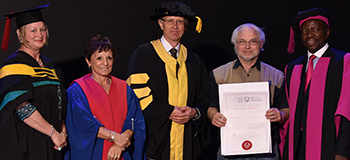Latest News Archive
Please select Category, Year, and then Month to display items
12 October 2020
|
Story Arina Engelbrecht
|
Photo Supplied
 Arina Engelbrecht from Organisational Development and Employee Well-being believes physical activity has a number of benefits for one’s health, including stress relief.
Arina Engelbrecht from Organisational Development and Employee Well-being believes physical activity has a number of benefits for one’s health, including stress relief.
Being physically active plays a big role in preventing the development of mental-health problems and in improving the quality of life of people experiencing mental-health problems.
Treatment for depression
Physical activity can be an alternative treatment for depression. It can be used as a stand-alone treatment or in combination with medication and/or psychological therapy. It promotes all kinds of changes in the brain, including neural growth, reduced inflammation, and new activity patterns are formed that promote feelings of calm and well-being. It releases endorphins – powerful chemicals in the brain that energise your spirit and make you feel good.
Physical activity can be very effective in relieving stress. Research in adults has found that physically active individuals tend to have lower stress levels compared to individuals who are less active. It also leads to improved sleep. When a person sleeps better and feels more rested, overall quality of life improves. They cope better with daily life stressors.
Reduce Alzheimer's risk
Regular physical activity can reduce your risk of developing Alzheimer's disease by up to 50%. It can also slow down further deterioration in those who have already started to develop cognitive problems. It stimulates the brain’s ability to maintain old connections as well as to make new ones.
A study asked people to rate their mood immediately after periods of physical activity (e.g. going for a walk/run, cycling, doing housework) and periods of inactivity (e.g. reading a book or watching television). Researchers found that participants felt more content, more awake, and calmer after being physically active compared to after periods of inactivity.
In conclusion, people who are physically active feel a sense of well-being, feel more energetic throughout the day, sleep better at night, have sharper memories, and feel more relaxed and positive about themselves and their lives.
“Being physically active not only changes your body, it changes your mind,
attitude, and your mood.” – Arina Engelbrecht
Community builders honoured at Community Engagement Awards
2016-10-13

Photo: Charl Devenish
The office of Community Engagement held its annual Community Engagement Awards at the University of the Free State (UFS) on 5 October 2016. This year, the ceremony celebrated people who gave themselves selflessly to improve the lives of those around them who are less privileged. Key players in various sectors of society were recognised and honoured for their contribution and commitment towards a common good.
Dr Richard Teare, president of the Global University for Lifelong Learning (GULL), was the keynote speaker at the ceremony. GULL, a non-profit foundation, operates across the world, providing access to lifelong learning for communities, giving each individual an opportunity to make a difference in their world. Dr Teare talked of places that lack the provision and infrastructure to access higher education and said that through community service programmes, social and economic development was enhanced, and the necessary expertise and resources were provided to drive a community towards a greater good. “Community engagement espouses academic excellence—it enables people to discover their full potential.”
Through its partnership with GULL, the University of Free State has worked with women from Bloem Shelter, an organisation that provides assistance to underprivileged women and children from diverse walks of life. The women were equipped with the necessary skills and knowledge they needed to become self-sufficient - an experience that has yielded positive, constructive change in the women’s lives.
The awards also acknowledged the boldness and innovative support of members of the Free State community in their various sectors. Among those awarded was Dr Choice Makhetha for her contribution in building capacity for those involved in community service programmes. She also designed and created approaches to improve situations in schools, churches, community organisations and small businesses. Also presented with an award was Dr Dipane Hlalele of the Qwaqwa Campus for his role as principal investigator in two National Research Foundation (NRF) -funded projects; Rural Relational Leadership and Sustainable Rural and Urban Connection. The ICT Innovation in School Education division of the South Campus was also recognised for its Internet Broadcast Project (IBP), which provides lessons on different subjects to 72 000 learners and 3 000 teachers each week.